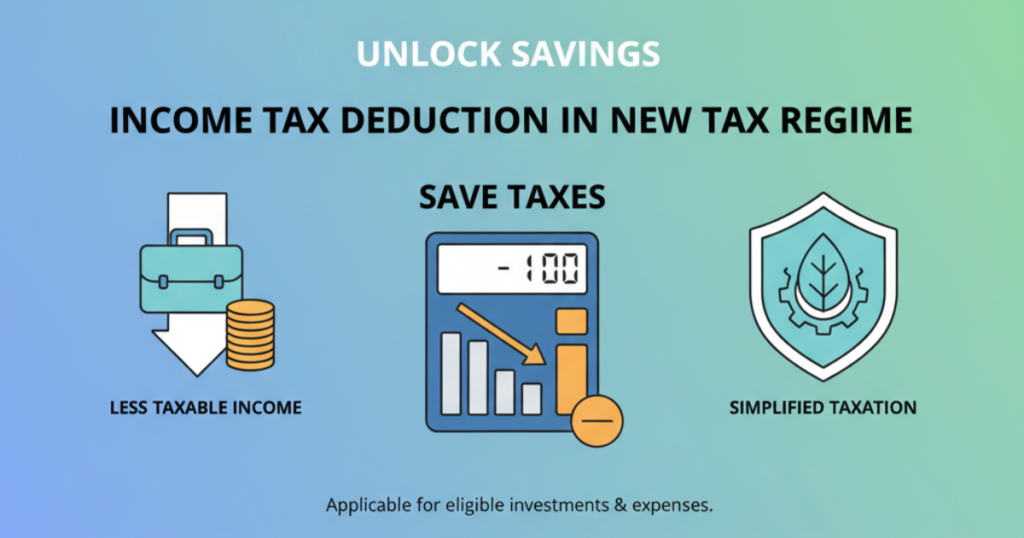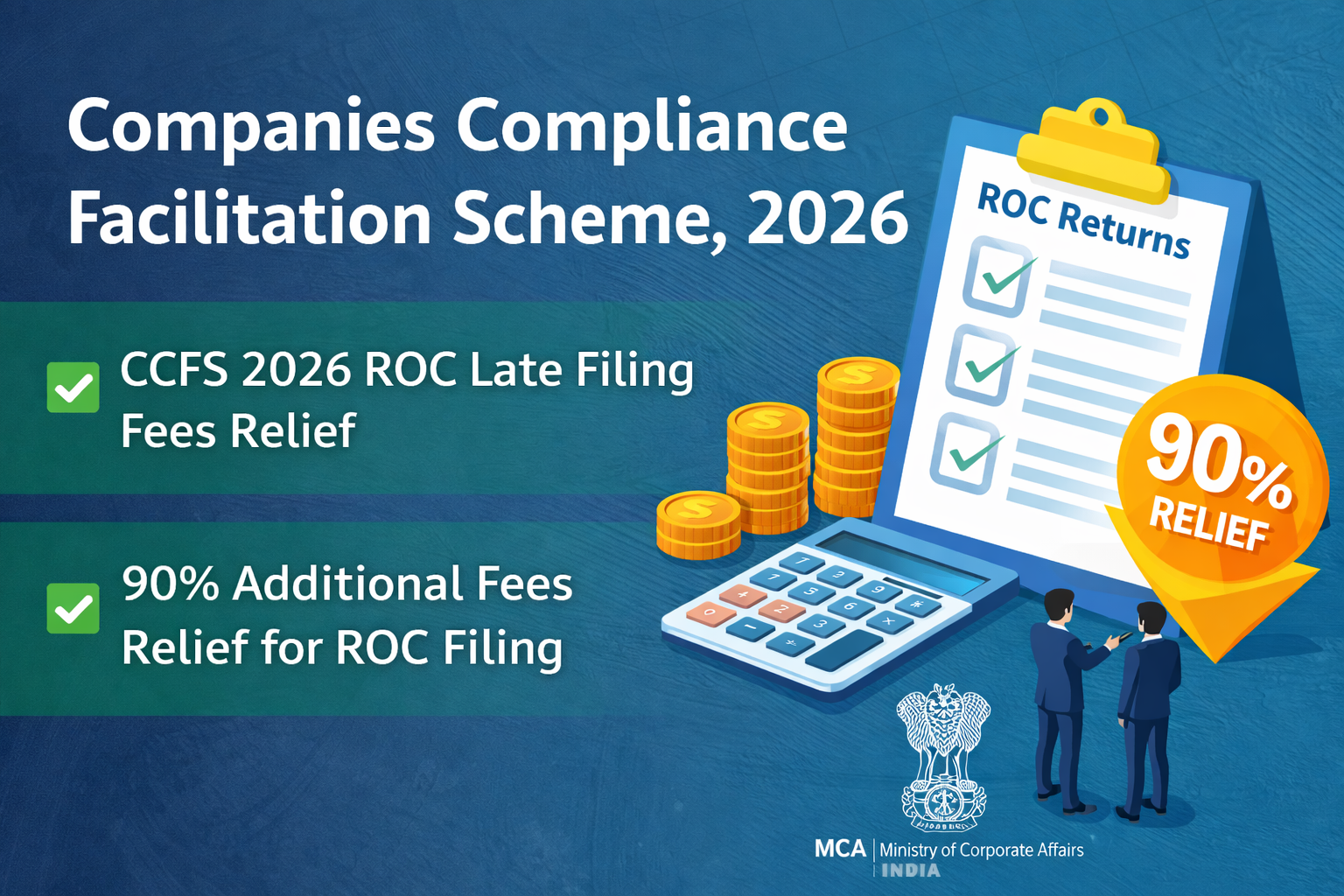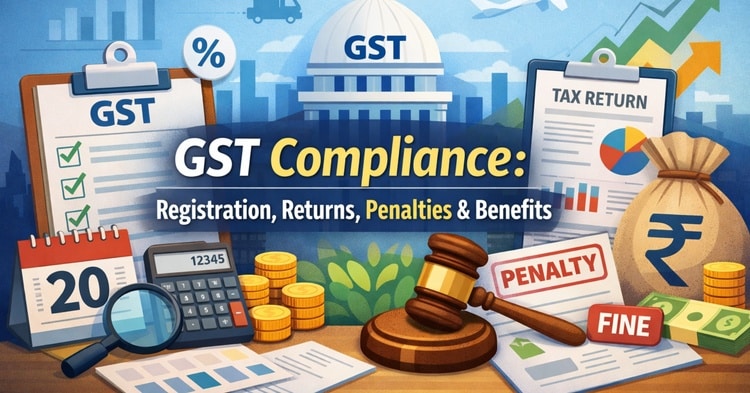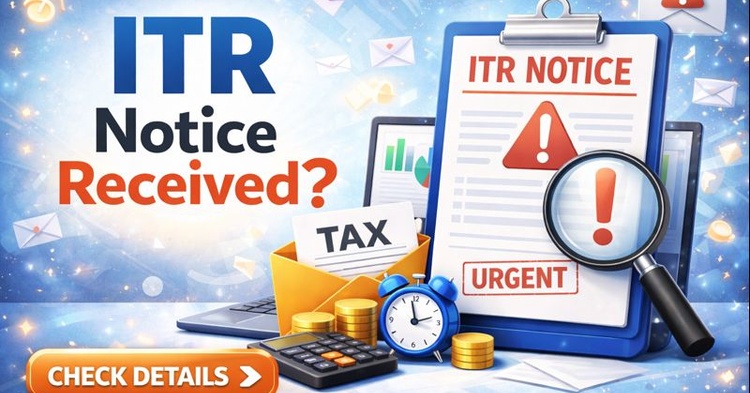Table of Contents
ToggleIntroduction
When you opt for the new tax regime under Section 115BAC for FY 2025-26 (Assessment Year 2026-27), you accept lower tax rates but lose most of the deductions and exemptions available under the old regime. But that doesn’t mean there’s no deduction in new regime — a few key deductions remain, and using them wisely can reduce your tax burden.
In this article, I’ll walk you through the top 8 deductions that survive (or are valid) under the new regime for 2025-26. I’ll explain how each works, what limits apply, and tips to claim them. By the end, you’ll know which deductions you should aim to use.
Top 8 Deductions in New Tax Regime
Below we have shared the details about Top 8 deductions in New Tax Regime;

1. Standard Deduction (for Salary / Pension)
Even under the new regime, salaried individuals and pensioners can claim a standard deduction from their salary / pension income.
For FY 2025-26, this deduction is ₹75,000 (this was increased in recent budgets for new regime)
This means irrespective of your actual expenses (like transport, uniform, etc.), you automatically get ₹75,000 off your gross salary, reducing taxable salary income.
Important caveat: There is some ambiguity due to a drafting issue in the Finance Act 2024 about whether the ₹75,000 applies fully for A.Y. 2026-27. But most tax commentary treats ₹75,000 as valid for FY 2025-26.
To claim it, you just apply this in the ITR schedule (salary computation) — no extra proof of expense needed.
This deduction is often the single biggest “free” reduction in your taxable income under new regime.
2. Employer’s Contribution to NPS (80CCD(2))
Under the new regime, while many deductions in Chapter VI-A are removed, the employer’s contribution to NPS (National Pension System) under Section 80CCD(2) is still allowed.
The limit has been increased. Employers can now contribute up to 14% of salary + dearness allowance (DA), which would qualify for deduction (i.e. it’s excluded from your taxable salary) under 80CCD(2).
This deduction is on the employer’s side (so the amount doesn’t enter your taxable salary), but it’s a meaningful tax saving for you.
Make sure your employer’s contribution is clearly documented (in salary breakups) and the deduction is reflected in Form 16 / salary statements.
Thus, “nps deduction in new regime” largely survives via employer’s share under 80CCD(2).
3. Gift Upto Rs. 50,000/-
Gift upto Rs. 50,000/- is also allowed as deduction in New Tax Regime.
4. Interest Deduction on Let-Out House Property (Section 24(b))
While home loan interest deduction for self-occupied properties has largely been removed under new regime, the interest deduction for let-out / rented properties is still allowed.
The full interest paid on a home loan for a property you rent out can be claimed as a deduction under section 24(b) against “Income from House Property.”
There is generally no upper cap on this interest deduction (unlike the ₹2 lakh cap under old regime for self-occupied property).
But note: your net loss in house property may be subject to restrictions on set-off and carry forward rules.
If your home is purely self-occupied, you cannot claim the home loan interest under new regime.
So, if you have one or more properties that you rent out, claiming the interest on loans against those properties is one of the more powerful deductions left in the new regime.
5. Voluntory Retirement
Exemption on voluntary retirement under section 10(10C) is also available in New Tax Regime.
6. Gratuity
Exemption for gratuity u/s 10(10) is available in New Tax Regime also.
7. Leave Encashment
Exemption for Leave encashment u/s 10(10AA) is also available in New Tax Regime.
8. Agniveer
Deduction of amount paid or deposited in the Agniveer Corpus Fund under Section 80CCH(2) is available in New Tax Regime.
List of Deductions NOT Available in New Tax Regime
Lots of taxpayers are also confused regarding the deductions which are not available in New Tax Regime. We have given below the list of the same for your reference;
HRA Exemption
House Rent Allowance (HRA) is a vital deduction for salaried individuals under the old regime. But in the new regime:
HRA Deduction in New Tax Regime is generally not available.
The new regime has eliminated most allowances and exemptions, including HRA, for most taxpayers.
So, even if your employer gives HRA as part of salary, you likely cannot claim a deduction for it under new regime (unless some transitional rules or special jurisdictional provisions apply, but ordinarily no).
This means that renting in a costly city gives no extra tax benefit in new regime.
Section 80C deductions
Under the old regime, Section 80C is a powerhouse: investment in PPF, life insurance premiums, ELSS, etc. But in the new regime, the scope of 80C deduction in new regime is heavily restricted:
As of now, section 80C deduction is not allowed under the new regime for most of its usual instruments (like PPF, EPF, ELSS, etc.).
That means “80C deduction in new regime” is mostly not applicable — you cannot claim the full 80C basket under the new regime.
In short: you cannot depend on 80C in the new tax regime like you did in the old regime.
Mediclaim Deduction - Section 80D
Health cover is increasingly essential. Under Section 80D, taxpayers could claim deduction for medical insurance premiums. Under the new regime:
Mediclaim deduction in new regime (i.e., 80D) is not allowed.
In other words, you cannot deduct your premium outlay for health insurance under the new tax regime.
That makes health insurance less tax-friendly in the new regime compared to the old.
NPS Deduction - Section 80CCD(1) / 80CCD(1B)
If you have invested in the National Pension System (NPS), it’s important to know how it works under the new tax regime.
In the old regime, you could claim tax benefits on your own NPS contributions:
Under Section 80CCD(1) – up to 10% of salary (for employees) or 20% of income (for self-employed).
Under Section 80CCD(1B) – an extra ₹50,000 deduction as an additional benefit.
However, in the new tax regime (FY 2025-26), these two deductions are not allowed. That means you cannot claim a tax deduction for the money you personally invest in NPS.
👉 What’s still allowed?
The employer’s contribution to your NPS account is still tax-free under Section 80CCD(2) — up to 14% of salary (for government employees) or 10% (for others).
So, while you can’t get a deduction for your own NPS deposits under the new regime, your employer’s contribution still helps you save tax — making NPS a good retirement-saving option even today.
80G Deduction
Charitable donations are encouraged by the government. Under Section 80G, you donate to qualifying institutions and claim deduction.
The 80G deduction in new regime is allowed, though with conditions and limits.
You can donate to government charities / funds / NGOs specified in the Income Tax Act and claim deduction (either 50% or 100%, with or without restriction).
You need proof of donation (receipt, registration number) and to ensure the donee is an approved institution.
Thus, if you give to eligible charitable organizations, you may still claim income tax deduction in new regime under 80G.
80TTA Deduction
Interest income deductions:
80TTA allows deduction on interest from savings bank accounts (up to ₹10,000) for non-senior citizens.
80TTB is for senior citizens, for interest on deposits (savings, fixed deposits) up to ₹50,000.
Under Deduction in New Regime:
These provisions (80TTA / 80TTB) are still allowed.
So you can claim interest deduction from savings bank accounts (80TTA) or broader interest (80TTB) if you qualify.
This is one of the few interest-based deductions still active.
Hence, one can say 80TTA deduction in new regime is valid (for non-senior citizens) and 80TTB deduction in new regime is valid (for senior citizens).
Home Loan Interest Deduction for Self-Occupied House
One of the biggest deductions for many taxpayers is home loan interest. But under the new regime:
Home Loan Interest Deduction in New Regime is mostly not allowed.
The section 24(b) deduction (interest on home loan for self-occupied property) and the section 80EEA / 80EEB incentives were removed for new regime taxpayers.
So, if you are under the new regime, you generally cannot deduct home loan interest payments.
Because this is a major loss for many, whether your home loan interest would give benefit is one of the deciding factors in choosing between regimes.

CharteredHelp is a team of experienced professionals providing tax, accounting, auditing, and compliance services for businesses and individuals. With over 10+ years of experience, we assist clients with GST registration and filings, income tax returns, company registration, trademark services, accounting, auditing, and handling tax notices. Our focus is on providing practical, reliable, and timely support to help clients stay compliant and grow their businesses with confidence.








